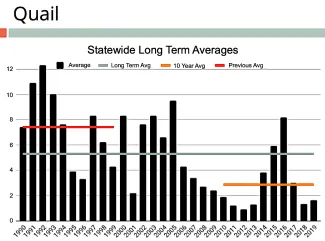
This year’s Quail Roadside Surveys across Oklahoma show a statewide population index of observed birds that is up 23.6 percent over 2018.
Heavy spring rains led to a delayed start to the nesting season for Oklahoma’s upland game birds but brought on an excellent forb and insect crop. Over summer, the southwestern part of the state was hit by drought, which had a negative effect on brood survival.
Overall, the surveys show some encouraging results with the northeast, southeast and southwest regions showing higher numbers than those in 2018. Slight decreases were observed in the northwestern and central parts of the state. Hunters should find conditions in most areas slightly improved over what they encountered last year.
The actual number of quail on the ground could easily be higher than these surveys indicate, due to poor conditions for observing in most regions. Wet conditions in most regions since May created unseasonably thick vegetation, which makes seeing quail much harder for surveyors.
Tell Judkins, Upland Game Biologist for the Oklahoma Department of Wildlife Conservation, said hunters should find similar conditions as last year in the northwest and west.
“We had a delayed hatch this year, but signs are pointing to multiple later hatches. The later hatches should provide improved numbers statewide as we head into season.”
During the August and October surveys, observers note the growth status of birds they see. In August, 10.8 percent of observed quail were half grown, 25.6 percent were three-fourths grown; and 63.6 percent were full grown. None of the birds seen during August were one-fourth grown.
In the October survey, 43 percent were three-fourths grown, and 57 percent were full grown.
Quail populations are historically cyclical; bird numbers often boom for several years then decline. A more accurate assessment of the health of quail populations is not based on year-to-year comparisons, but rather on longer-term averages that better account for the natural boom-and-bust cycles. Hopefully 2019 is the start of another increase in our quail populations, biologists said.
“Ultimately, if we want to see these numbers improve, it's going to take two things: great weather and suitable habitat. While we can't control the weather, properties around the state can be improved for quail. Then, when we have great weather, the quail will also have a great year," Judkins said.
The take-away from the 2018 quail surveys for hunters is that harvest success will be affected by where they choose to hunt.
“It will definitely be worth going out. We’ve got a lot of great public areas to go quail hunting,” he said. “Work some ground, trust your dog, and make a memory!”
Biologists will get a better idea of the real population numbers after hearing reports from quail hunters during this hunting season. And despite what the annual surveys indicate, hunters are urged to get out in the fields and learn for themselves how the quail hunting stacks up this year.
Quail hunting season in Oklahoma will run from Nov. 9 to Feb. 15, 2020. For complete information and license requirements, consult the current Oklahoma Hunting and Fishing Regulations Guide found online at wildlifedepartment.com, on the Go Outdoors Oklahoma free mobile app for Apple or Android devices, or in print across the state wherever hunting and fishing licenses are sold.
DONATE YOUR WINGS
This year, the Wildlife Department is again collecting quail wings from selected public hunting areas to better evaluate the state’s quail population. If you harvest a quail at a wildlife management area where wing collection boxes are located, please take the time to place one wing (left wing preferred, but whichever is less damaged) from each quail. in a collection box. The WMAs with wing collection boxes will be Beaver River, Cooper, Cross Timbers, Drummond Flats, Fort Supply, Kaw, Packsaddle, Pushmataha and Sandy Sanders. Hunters are also asked to complete a short survey about their donated wings. Biologists will study the donated wings to further understand the status of quail in each area.
ABOUT THE SURVEYS
The Wildlife Department has conducted annual roadside surveys in August and October since 1990 to track quail populations across Oklahoma. The surveys provide an index of annual quail population fluctuations. Surveyors report the number of quail observed to create an index of quail abundance (number of quail seen per 20-mile route) and an indication of reproductive success in each of six regions of the state. Surveyors drive 83 routes in 75 of Oklahoma’s 77 counties. Some larger counties have two routes.
For graphical breakdowns of the state's quail population by region, see the 2019 Quail Season Outlook.